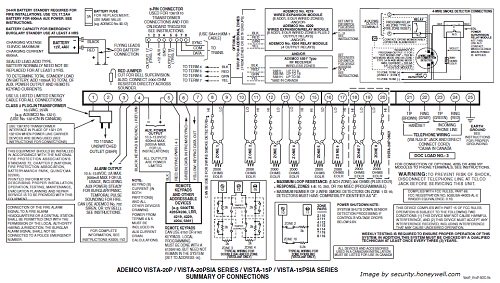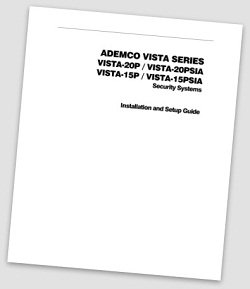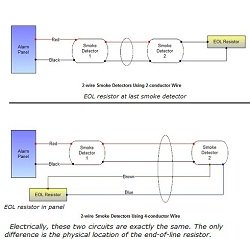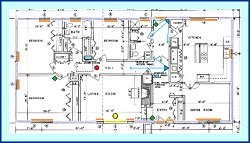- Home
- Compare Systems
- Cheap Systems
- Free Quotes
- DIY Systems
- Hardwired Systems
- Wireless Systems
- Smoke Detectors
- Medical Alarms
- Alarm Monitoring
- Cameras & Video
- Ademco
- ADT Security
- Brinks Security
- Broadview
- DSC Security
- FBI Alarms
- GE Security
- Honeywell
- Link Interactive
- Monitronics
- Moose
- Napco
- Protection 1
- Radionics
- Simplisafe
- Alarm Manuals
- Alarm System Parts
- Alarm Tools
- Troubleshooting
- FAQ
- Glossary
- Sitemap
- About Me
- Contact Me
Ademco Vista 20P
Wiring Diagram
The Ademco Vista 20P has been one of the most popular Ademco/Honeywell alarm systems ever built, and for good reason. It offers wireless and hardwired zone expansion, easy installation, and minimal programming out of the box.
If you’re installing a DIY home alarm system, you might want to consider using this panel. Basic kits are inexpensive, flexible, and widely available on the web.
Professional alarm installers can even use the Vista 20P for custom designed security systems, due to its many features and programming options.
This page explains how to make connections to the terminals on a Vista
20P. The image of the Honeywell Vista 20p wiring diagram is small, but you can click to enlarge it.
(Click or tap on image to enlarge)
Also, I highly recommend that you download a free copy of the complete
Ademco manual, which will include a full-size image of the wiring diagram. It also gives detailed specs and ratings for the system and
all its terminals.
Check out my alarm system manual sources page to find free installation and programming manuals for the Ademco Vista 20P as well as other brands of alarm panel.
See this page for help finding my Ademco model number.
Ademco Vista 20P Terminal Connections
1 & 2 - AC Terminals
The Ademco Vista 20P is powered by a low-voltage transformer supplying 16-18 volts AC. Connect each lead of a 2-conductor wire to these terminals. Since this is alternating current, you don’t need to worry about polarity.
Be careful not to allow the leads from the transformer touch each other while the unit is plugged in! Shorting out the transformer can easily blow its internal fuse, turning it into a paperweight. While making connections, either leave the transformer unplugged, or keep the wires separated.
3 & 4 - Siren Output
12-volts DC output, 2-amps maximum current. This can be used for sirens, bells, strobes, or other devices up to the rated output.
The Ademco Vista 20P has the ability to supervise the bell connection,
so you’ll get a trouble beeping at the keypad if the siren wire is cut.
To enable this feature, cut the red jumper on the circuit board; it’s
located just above the terminal strip on the left end.
4 & 5 - Auxiliary Power (Aux Power)
These terminals supply 12-volt power to operate keypads, zone expanders, motion detectors, and other devices. Terminal 5 is positive, terminal 4 is negative.
The maximum current available for all keypads and detection devices is 600mA. If you need more than this, you can add a supplemental power supply. Preferably, this extra power supply would have its own battery backup, so it will continue to work during a power outage. If this isn't possible, make sure at least one keypad is connected to the Vista 20P's own power terminals.
If you have many devices to connect, you’ll soon have trouble fitting
them all under the screw terminals. To fix this issue, connect a single
short pigtail of 18-gauge wire to each terminal, preferably using red
for positive and black for negative. Then, connect the necessary wiring
to the appropriate pigtails using wire nuts.
6 & 7 – Data
Connect data leads from keypads, zone expanders,
or other data devices. Include at least one Ademco 6160 keypad to make
advanced programming easier.
Color code for typical 4-conductor connection:
Red = +Power
Black = -Power
Green = Data terminal 6
Yellow = Data terminal 7
The typical wiring used for any devices requiring data, such as keypads, is 4-conductor jacketed cable. This cable is usually manufactured with the colors red, black, green, and yellow (or white) for the individual wire insulation. This makes it easy to keep track of the power and data pairs, as well as the polarity of each.
Ademco deserves extra credit for designating these terminals by color,
rather than by “in” and “out”. Doing so simplifies wiring, since “green”
at the panel end is the same as “green” at each device. The same is
true for the “yellow” data lead. A minor point, but I welcome anything
that saves time and confusion!
To make fast programming changes, you can temporarily connect a 6160 keypad to a panel using this Alarm Programming Quick Keypad Connector.
Terminals 8-20, Zones 1-8
The Ademco Vista 20P has the capacity for 8 on-board zones using basic connections. Each zone uses a 2,000-ohm (2K ohm) end-of-line resistor, which can be located at the alarm contact or inside the panel.
Zone doubling is an optional connection scheme that this panel supports; it adds 7 more
hardwired zones to panel with no additional hardware. This hookup arrangement is a bit more
advanced, so I’ll cover it in a separate article.
Zone 1, terminals 8(+) & 9(-), can be used for 2-wire smoke detectors. This allows the addition of fire protection to the panel without any extra modules or equipment, other than the smoke detectors themselves.
Up to (16) 2-wire smoke detectors can be used on zone 1 (Up to (10) for
ESL detectors with the “clean me” option enabled). Check the detector
specifications to be sure they have a compatibility identifier of “A”.
If you’re installing any 2-wire smokes, place the end-of-line resistor (EOLR) across the terminals of the last smoke detector in the run. This provides a supervision alert from the keypads in case of a damaged fire wire. Fire zones use “normally open” type loops, so the EOLR always goes across the loop.
The Ademco Vista 20P also supports 4-wire smoke alarms, but a relay will
need to be added. This is to allow the panel to switch off power to the
smokes during a “smoke detector reset” command.
For more details on wiring smoke detectors, see:
Smoke Detector Circuit Basics
Connecting 2 wire Smoke Detectors
Connecting 4 wire Smoke Detectors
Zones 2-8, Standard Burglary Zones
Looking at the wiring diagram,
zones 1 & 2 each have dedicated terminals for the “Hi” (+) and “Lo”
(-) sides of their loops. Zones 3 through 8 share their “Lo” sides in
pairs. This is referred to as a “common negative” connection scheme, and
is quite common in alarm panel design. This is done mainly to simplify
the layout of the control board, as well as to save space.
Burglary zones use “normally closed” loops, so always connect the EOLR in series with the loop.
Note that the Ademco Vista 20P, like many other panels, can be
programmed to not use end-of-line resistors on burglary zones. This
option simplifies wiring, and cleans up the panel a bit.
Telephone Wiring, Terminals 21-24
Connect the flying leads of an RJ-31X cord to the terminals as shown. The Ademco Vista 20P diagram inside the lid indicates the standard colors for each screw terminal, making things easy.
When wiring the RJ31X jack, be sure the pair of wires feeding phone line
in to the jack goes to the red and green screw leads. The pair sending
dial tone back to the premise phones should connect to the opposite pair
of terminals, colored brown and gray.
If these wires are hooked up backwards, the panel will seize the wrong
side of the telephone feed. This will kill dial tone to the house
phones, but the panel won’t be able to send any signals to the central
station.
Earth Ground, Terminal 25
The main purpose of an earth ground connection on alarm panels is to provide lightning protection. The idea is that a voltage surge will tend to travel across spark gaps and other protective devices built into the circuit board, trying to reach ground potential.
It may be somewhat difficult to find a “good” earth ground, for a couple of reasons:
- Some homes are built with plastic water lines coming from the street, changing to copper pipe just a few feet before entering the structure. Connecting to these pipes won’t give very good grounding, especially in dry soil.
- House wiring grounds can also be a source of electrical noise, due to dimmers and other devices. This noise can sometimes cause problems with an alarm panel, though it’s rare in my experience.
The bottom line: If you happen to have a convenient earth ground near
the alarm panel, go ahead and connect to it. If not, don’t sweat it. The
Ademco Vista 20P has very good built-in lightning protection, even
without an earth ground connection.
More information on Honeywell Security Systems.
See a similar system made by GE Interlogix, the GE Concord 4 Security System.
If you have an older Ademco system that's starting to have problems, you may be thinking about replacing it.
To
find out how much a new system might cost, get some free price quotes
from alarm dealers in your area. Just answer a few questions below, and
you'll receive your quotes via email.
These quotes are absolutely free!
Return to Home-Security-Systems-Answers from Ademco Vista 20P Wiring Diagram
Return to Ademco Home Security Systems from Ademco Vista 20P Wiring Diagram
Note: Feel free to print any of the articles on this site for personal, non-commercial use. Just look for this button:
If you found this website especially helpful, you might want to consider making a small donation. Since 2011, AzAlarmGuy has been providing free help and advice on home security systems to all of those in need.
Your gift, in any amount, will help me keep this website a free resource for anyone needing help with alarm system issues or questions.
Disclosure
I receive affiliate commissions from some of the companies and products I discuss. These commissions don't change the price that you pay.
Rest assured that this compensation does not influence my recommendations. I only endorse products and services that I truly believe to be an honest value for you, as a visitor to my site.
For more details, see my full disclaimer.










